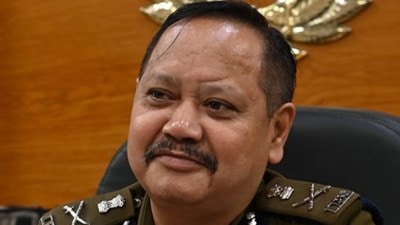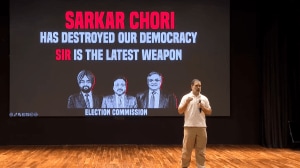Ritu Sarin is Executive Editor (News and Investigations) at The Indian Express group. Her areas of specialisation include internal security, money laundering and corruption. Sarin is one of India’s most renowned reporters and has a career in journalism of over four decades. She is a member of the International Consortium of Investigative Journalists (ICIJ) since 1999 and since early 2023, a member of its Board of Directors. She has also been a founder member of the ICIJ Network Committee (INC). She has, to begin with, alone, and later led teams which have worked on ICIJ’s Offshore Leaks, Swiss Leaks, the Pulitzer Prize winning Panama Papers, Paradise Papers, Implant Files, Fincen Files, Pandora Papers, the Uber Files and Deforestation Inc. She has conducted investigative journalism workshops and addressed investigative journalism conferences with a specialisation on collaborative journalism in several countries. ... Read More
When Telgi tattles, 12 pages trap his nationwide nexus
In 1999, there was no success. In 2000, it was successful. In 2001, it was full-fledged. In 2002, I was in jail. In 2002 all were in jail. T...

In 1999, there was no success. In 2000, it was successful. In 2001, it was full-fledged. In 2002, I was in jail. In 2002 all were in jail. There was full stock of fake stamps and there was no question of printing in 2002.
This uncharacteristically crisp update of the stamp scam is by the man himself, Abdul Kareem Ladsaab Telgi. As you read this, he’s undergoing a crucial second round of interrogation in Bangalore, a precursor to ensuring his aides— criminals, policemen, politicians and jailors—are nailed for their crimes.
Fortunately, the man regarded as India’s greatest forger isn’t likely to protect the men who helped him set up his once-sprawling criminal empire.
For, the 12-page report of the first interrogation—conducted over 15 days in August 2003 and now made available to The Sunday Express—resulted in their arrests in the first place.
The report dispels the notion that the former peanut vendor is reticent. Instead, he freely explains where he got the inspiration for his ingenious crimes: in jail.
He also freely reveals the nerve centre of his operations: jail.
|
Telgi unpeeled: real-estate to bank accounts
|
||
|
From Bangalore hotel to hospital, he pumped his wealth • No 50/10 Palace Road: Office • No 100, Frazer Town: Commercial complex • Corporation No 92, Mosque Road: Apartment • Coffee Shop, hotel on Brigade, 5th Avenue • Sana Hospital: Named after daughter Sana, paid Rs 60 lakh • Sujatha Theatre: paid Rs 20 lakh Bank accounts Telgi admits to having operated in Bangalore (most of the accounts have since been frozen): • Canara Bank, Kalasipalayam, in name of Metro Transport Corporation Story continues below this ad • Amanath Co-operative Bank, N R Road branch, in the name of Metro Corporation • Vysya Bank, Sr Marks branch, Metro Corp • Amanath Co-operative Bank, Brigade Road Branch, in the name of Coffee Shop |
||
‘‘It was free for all,’’ says Telgi of 2001-02, when Bangalore jail was run by Superintendent Jaysimha, now in jail himself.‘‘During the period of Jayasimha, the relaxation in the jail was not only for me. If you spent a little money, you could enter the jail. It was free for all. I was using mobile phones…Badruddin and Rafi (his associates) also used to contact over mobile phones. I have contacted many people including my mother.’’
Jail was a cosy meeting meeting place for Telgi’s ‘‘police friends.’’ Delhi Police Inspector Pooran Singh (now under arrest) came to talk to him about certifying fake stamp papers. Mumbai Assistant Inspector Dilip Kamath (also under arrest) came too.
‘‘Dilip Kamath was not in uniform,’’ says Telgi. ‘‘He met me in the separate room in the first floor. He met me two times in Bangalore, He was mainly asking about my bail, and Mumbai case, when I wanted to go to Mumbai etc. I replied that I was ready to come at any time.’’
His big idea came, ironically, when he was arrested by the Mumbai police for making a fake visa in 1993. In the police lock-up, one Ram Ratan Soni suggested that he get a fake-stamp licence.
There was no looking back.
‘‘I was granted the license during March 1994. Since then Ram Ratan Soni was supplying fake stamps which I was selling as genuine stamps along with some small quantity of stamps purchased by placing indent with the stamp depot. He started giving me first 10%, then 20%, then 25% of the sale amount as the commission for the sale of stamps…it was during this period in December 1994, I conceived the idea of starting my own printing of stamps and in this connection I started visiting Nashik where the original stamps and stamp paper are printed.’’
Telgi’s tattles, as per his interrogation report:
• On his visa scam: Telgi says when he returned from Saudi Arabia in 1986, he began to sell fake visas. ‘‘I brought 60 visas of the same company. I got Rs 10,000-Rs 12,000 commission for each visa. I got about Rs 6 lakh…second time when I came to India I brought 28 visas. I sent 28 persons for different trades to the Kingdom of Saudi Arabia.’’
• On Karnataka Minister Roshan Baig: ‘‘I know Roshan Baig through his brother Rehan Baig. Roshan Baig told me to see whether I can help Rehan Baig by engaging him in some business. I applied for kerosene license. At that time, Roshan Baig helped me. Then Roshan Baig was the Minister … I used to go with my driver while going to meet Roshan Baig at Hotel Taj in Mumbai. 2-3 times I met him there.’’
• Scam in prison: Telgi admits that during his detention in a Bangalore jail, (2001-2002), he shut shop, but only briefly. ‘‘After one month of my arrest, printing of fake stamps and stamp paper was stopped and resumed again after some time…I was in contact with (associates) Badruddin, Rafi and Byroji Rao and many others. Badru and Rafi used to meet me daily. Everyday I used to talk to them…there were no proper entries made regarding visitors to jail not only in respect of me but also in respect of others. They used to put some seal on the hands of the visitors, which could be erased with water.’’
• Network of suppliers: Telgi narrates how by 1998, he was receiving fake stamps from suppliers located in Mumbai and Kolkata (some were dispatching the goods by courier)—and earning a commission as high as 45-55%. He also talks about how he kept getting arrested but also being bailed out.
‘‘By the end of 1996, the offices in different places were fully operational…initially, the stamps sold were the stamps which were procured from Kolkata, which were called gum-washed stamps. Gum washed stamps means the stamps which were used once and later treated by chemicals and re-used.’’



- 01
- 02
- 03
- 04
- 05





























